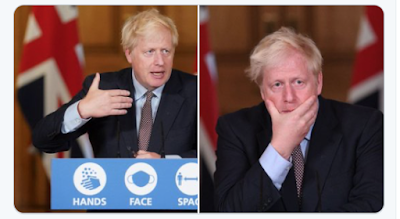Robert Mahoney, deputy executive director of the US-based Commmittee to Protect Journalists, launching the U.S. Press Freedom Accountability Project which will award grants for coverage of attacks on journalists during Black Lives Matter protests: “For more than a generation, the Committee to Protect Journalists has defended journalists around the world by reporting on attacks and threats against the press. Now it’s time to intensify these efforts at home. Only by holding accountable those who have assaulted or hindered the work of the press during the Black Lives Matter protests do we ensure that reporters can serve us, the public.”
- The U.S. Press Freedom Tracker is investigating reports of more than 700 press freedom violations, including arrests, assaults, tear gassing, and journalists hit with rubber bullets, during Black Lives Matter protests around the U.S. since late May.
Amal Clooney in her letter resigning as the UK government's special envoy for media freedom, as reported by the Huffington Post: ''I have always been proud of the UK's reputation as a champion of the international legal order, and of the culture of fair play for which it is known. However, very sadly, it has now become untenable for me, as Special Envoy, to urge other states to respect and enforce international obligations while the UK declares that it does not intend to do so itself."
Ian Murray, executive director of the Society of Editors, in a statement: “The Society is deeply concerned journalists were not allowed to follow-up Professor Whitty and Sir Patrick Vallance’s briefing with questions. Throughout the entirety of the pandemic, the government has stressed its policy of 'following the science' and it is only right that journalists, on behalf of the public, are permitted to question that science and the scientists that are helping to lead the government’s response."
Alan Rusbridger on Twitter: "Charles Moore is an elegant and provocative columnist. But it is inconceivable someone fined for refusing to pay a licence fee (in protest at a programme he didn't like) should be Chair of the BBC, an organisation he appears to loathe."
James Marriott in The Times [£]: "Twitter-addicted journalists are popularly supposed to overegg the importance of social media but it’s a crucial factor in the way we think and talk about power. Indeed, one of the most important things social media does is to induce feelings of powerlessness. Thanks to Twitter, politicians, newspaper columnists and the PR managers of big brands who spent the first decades of their careers meeting the public under relatively controlled circumstances are exposed to the power of the mob every day. Brands overreact and cave when confronted with swirling storms of outrage, journalists panic and decide they’re being cancelled."
Jonathan Heawood, executive director of the Public Interest News Foundation, which has just been granted charitable status: "This decision means we can ensure the public have access to high-quality, independent news, by supporting public interest publishers with grants, training and resources. We have already awarded emergency grants to publishers who were struggling during lockdown, and now we can support more public interest news organisations across the UK.”
David Higgerson on Twitter: "I find it boggling that often new journalism titles/products spend more time saying what they won't do (a passive-agg way of criticising existing publishers) rather than celebrating what they will do. Imagine if Cadbury launched chocolate celebrating 'fewer bubbles than an Aero'."
Chris Deerin in the Press & Journal on being a Scot joining the Sunday Telegraph to run the comment section in the mid 2000s: "It was like Sid Vicious joining the London Philharmonic.The English gentry get nervous around gruff, sweary Scots, so I adopted a persona that was part Bill Shankly, part Taggart. I cajoled and argued and took the mickey. By the time I left, a decade later, I had found my place and, I think, acquitted myself well enough. But I never quite got used to, or bridged, the class divide. I was never going to, of course. Our work experience kids had names like Peregrine and Camilla, and were often louchely arrogant. My better-off colleagues glided through life. The wealthy upper classes live and work differently – a job is a way to pass the time or to fulfil their inevitable destiny, not a lifeline between survival and catastrophe. There is often an easiness, a lightness, to them."
At the Leveson Inquiry: "We have a situation where newspapers employ private detectives. We used to employ reporters".
Alan Rusbridger on Twitter: "Charles Moore is an elegant and provocative columnist. But it is inconceivable someone fined for refusing to pay a licence fee (in protest at a programme he didn't like) should be Chair of the BBC, an organisation he appears to loathe."
Hugh Grant on twitter: "Astonished and revolted to see @DailyMailUK has a prominent ‘interview’ with me today. Never spoke to them. Yuk."
Nigel Pauley on Twitter: Incredibly disingenuous of Hugh Grant to snag a front cover of the UK’s biggest selling newspaper magazine to plug his latest film - then moan about it.. and claim he never spoke to them. He may or may not not have spoken to the Mail direct but he gave a pool interview to the Hollywood Foreign Press Association which is basically full of freelances who provided copy for papers and magazines .. like the Mail."
Anthony Bellanger. International Federation of Journalists general secretary, in a statement backing a campaign for governments to tax major internet companies and support print media: “The current global health crisis is significantly increasing the great difficulties facing the print media sector. Governments need to react urgently. The sector is a public good and a crucial pillar of our democracies. Governments are well aware of this. Indeed, with the COVID crisis they have identified the sector as essential. Today, they cannot just watch the ship sink from their balconies.”
David Higgerson on Twitter: "I find it boggling that often new journalism titles/products spend more time saying what they won't do (a passive-agg way of criticising existing publishers) rather than celebrating what they will do. Imagine if Cadbury launched chocolate celebrating 'fewer bubbles than an Aero'."
Chris Deerin in the Press & Journal on being a Scot joining the Sunday Telegraph to run the comment section in the mid 2000s: "It was like Sid Vicious joining the London Philharmonic.The English gentry get nervous around gruff, sweary Scots, so I adopted a persona that was part Bill Shankly, part Taggart. I cajoled and argued and took the mickey. By the time I left, a decade later, I had found my place and, I think, acquitted myself well enough. But I never quite got used to, or bridged, the class divide. I was never going to, of course. Our work experience kids had names like Peregrine and Camilla, and were often louchely arrogant. My better-off colleagues glided through life. The wealthy upper classes live and work differently – a job is a way to pass the time or to fulfil their inevitable destiny, not a lifeline between survival and catastrophe. There is often an easiness, a lightness, to them."
On the local press in an article for Local Newspaper Week: “I must stress that the relationship between a local newspaper and its community has to be robust. If the relationship is be based on mutual respect, the local newspaper may have to puncture local pride, risk offending advertisers as well as authority; mere boosterism is no substitute for honest, thorough reporting . After a lifetime in journalism, however I have no doubt that when it is true to its community, the local newspaper is an incomparable resource, one to nurture and cherish.”
[£]=paywall















































